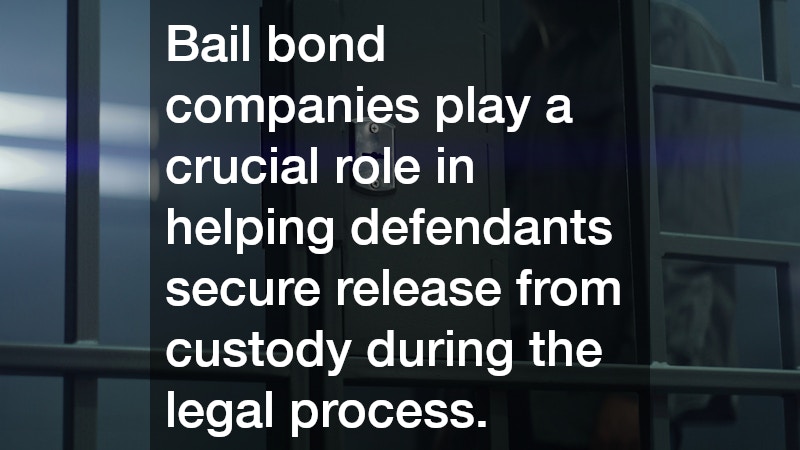Navigating the legal system can be overwhelming, especially when you or a loved one faces arrest and bail is required. Bail bond companies often become an essential part of this process, providing a way to secure release from custody before trial. However, many people are unaware of their legal rights when dealing with these companies. Understanding your rights can protect you from unfair practices and ensure the bail process goes as smoothly as possible.
In this article, we will explore the basics of bail bonds, the role of these companies, and most importantly, the legal rights defendants and their families have when working with them.
What Are Bail Bonds and How Do They Work?
When someone is arrested, a judge may set a bail amount, which is a monetary guarantee to ensure the defendant appears at future court dates. Bail serves as a financial incentive for defendants not to flee before their trial.
However, not everyone can afford to pay the full bail amount upfront, which is where bail bond companies come into play. These companies act as sureties by posting the full bail amount on behalf of the defendant in exchange for a non-refundable fee, typically around 10-15% of the total bail. Once the fee is paid, the defendant can be released while awaiting trial, but if they fail to appear in court, the company may seek to recover the full bail amount by locating and returning the defendant to custody.
Your Legal Rights When Engaging Bail Bond Companies
Understanding your legal rights when dealing with these companies is crucial. They operate within a regulated framework, but misunderstandings or exploitation can occur. You have the right to a clear explanation of all fees and conditions before signing any agreement. The fee amount and any additional costs or collateral requirements must be disclosed upfront. It is important that you receive a written contract detailing these terms. Never sign anything without fully understanding your obligations.
You also have the right to know exactly what collateral is required, how it will be handled, and under what circumstances it could be forfeited. Sometimes these companies ask for collateral to secure the bond, which could be property, vehicles, or other valuables. Collateral agreements should be clearly documented in writing. Your interactions are subject to privacy laws, meaning your personal information must be handled confidentially and cannot be disclosed unnecessarily. If you suspect your privacy rights are being violated, you can seek legal advice or report the issue to the relevant regulatory authorities.
Common Pitfalls and How to Avoid Them
While these companies provide a valuable service, there are common pitfalls that defendants and their families should watch for. One key point to remember is that the fee you pay is non-refundable, even if the charges against the defendant are dropped or they are found not guilty. This fee is not a loan or deposit but a charge for the service rendered. It is important to clarify this before signing any agreements. Another common mistake is ignoring the conditions of the bond. The defendant must comply with all court conditions, including appearing at all hearings. If the defendant skips bail, the company can seek to recover the full bail amount and may send a bounty hunter to locate and return the defendant. Understanding these consequences fully is essential to avoid further complications.
What Happens If Someone Skips Bail?
Failing to appear in court can trigger serious consequences both legally and financially. When a defendant skips bail, the court typically issues a warrant for their arrest. The company then becomes liable for the full bail amount and will attempt to recover this by locating the defendant. Some employ bounty hunters or recovery agents authorized to track down and detain the defendant to avoid losing money. This practice is legal but can be stressful for the defendant and their family. It is important to understand the seriousness of skipping bail and communicate openly if issues arise.
How to Protect Your Rights When Using Bail Bond Services
Taking proactive steps can help you avoid problems when working with a bail bond provider. Researching reputable companies by checking licensing and reviews before committing is essential. Legitimate companies are regulated by the state and have clear policies. Don’t hesitate to ask about fees, collateral, and processes upfront. A trustworthy company will be transparent and willing to answer your questions. Keeping documentation, such as copies of all agreements and receipts for your records, can protect you in case of disputes. If you are unsure about your rights or the terms, seeking legal advice before signing anything is always a wise choice.
Bail bond companies play a crucial role in helping defendants secure release from custody during the legal process. However, working with these companies requires a clear understanding of your legal rights to protect yourself and your family from unfair or deceptive practices. By knowing your rights regarding fees, contracts, privacy, and fair treatment, you can navigate the bail bond process more confidently and avoid common pitfalls. If you or a loved one needs to use a bail bond company, take the time to research, ask questions, and consult legal professionals if necessary. Ultimately, understanding your legal rights empowers you to make informed decisions in a challenging and often stressful situation.
